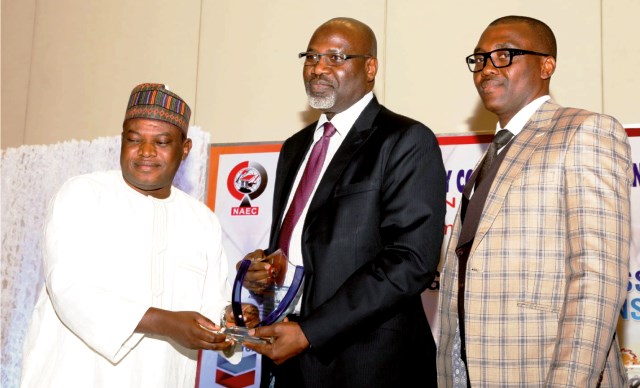Business
NCC Boss Tasks Telecom Firms On Research Funding

The Executive Vice Chairman, Nigerian Communications Commission (NCC), Prof. Umar Danbatta, has tasked telecommunications companies on the need to fund researches and innovations that will improve the industry.
Danbatta made the call on Wednesday in Abuja at the Second Stakeholders’ Forum with the Academia, tagged: “Academia Acceleration for Innovation, Industry Growth and Sustainability’’.
According to him, telecom companies should establish research and innovation centres in Nigerian universities, in line with what NCC is doing to transform research and development.
He urged them to embark on Corporate Social Responsibility (CSR) initiatives to drive local content development.
“The telecommunications industry should encourage the funding of academia and the academia must understand that research sponsors have a stake in the outcomes.
“The input of the telecommunications industry is necessary for curriculum development. Telecom operators should therefore be encouraged to have research and development units,’’ he said.
Danbatta said that the research project, which started in 2013 and with the maiden interactive forum with the academia in 2017, there was an increase in research proposals.
He said that submission of researches proposals climbed from 56 in 2016 to about 96 currently.
“And this came up to about 90 per cent and in appreciation of the development, the research budget was subsequently increased,’’ he said.
Danbatta said that NCC also recently approved a Collaborative Academia Stakeholders Meetings to discuss more on how to improve on Research and Development (R&D).
He said that apart from the involvement of the university heads, such meetings would meaningfully engage lecturers currently teaching in Nigerian tertiary institutions.
Prof. Eghosa Osaghae, former Vice-Chancellor, Igbinedion University, Okada, said that the country lacked what it took to embrace research and development seriously.
He expressed concern that industries in the countries invest so little on R&D and the academia.
“Our best brains have drained abroad where they are doing extraordinary things in science, technology and medicine, to further develop their developing receiving countries.
“The industrial sector in Nigeria has to critically re-examine itself. It must de-colonise its import-substitution orientation to be able to make use of the academia in any meaningful way,’’ he said.
Earlier, Mr Ubale Maska, the Executive Commissioner, Technical Services, NCC said that the forum would help the academia play a vital role in the growth of the industry.
Business
Kenyan Runners Dominate Berlin Marathons
Kenya made it a clean sweep at the Berlin Marathon with Sabastian Sawe winning the men’s race and Rosemary Wanjiru triumphing in the women’s.
Sawe finished in two hours, two minutes and 16 seconds to make it three wins in his first three marathons.
The 30-year-old, who was victorious at this year’s London Marathon, set a sizzling pace as he left the field behind and ran much of the race surrounded only by his pacesetters.
Japan’s Akasaki Akira came second after a powerful latter half of the race, finishing almost four minutes behind Sawe, while Ethiopia’s Chimdessa Debele followed in third.
“I did my best and I am happy for this performance,” said Sawe.
“I am so happy for this year. I felt well but you cannot change the weather. Next year will be better.”
Sawe had Kelvin Kiptum’s 2023 world record of 2:00:35 in his sights when he reached halfway in 1:00:12, but faded towards the end.
In the women’s race, Wanjiru sped away from the lead pack after 25 kilometers before finishing in 2:21:05.
Ethiopia’s Dera Dida followed three seconds behind Wanjiru, with Azmera Gebru, also of Ethiopia, coming third in 2:21:29.
Wanjiru’s time was 12 minutes slower than compatriot Ruth Chepng’etich’s world record of 2:09:56, which she set in Chicago in 2024.
Business
NIS Ends Decentralised Passport Production After 62 Years
Business
FG To Roll Out Digital Public Infrastructure, Data Exchange, Next Year
-
Maritime2 days ago
Minister Tasks Academy On Thorough-Bred Professionals
-
Maritime2 days ago
Customs Cautions On Delayed Clearance, Says Consignees May Lose Cargo
-
Maritime2 days ago
NCS Sensitises Stakeholders On Automated Overtime Cargo Clearance System
-
Maritime2 days ago
Lagos Ready For International Boat Race–LASWA
-
Maritime2 days ago
Shoprite Nigeria Gets New Funding to Boost Growth, Retail Turnaround
-
Politics2 days ago
I Would Have Gotten Third Term If I Wanted – Obasanjo
-
Sports2 days ago
Bournemouth, Newcastle Share Points
-
Sports2 days ago
Iwobi Stars As Fulham Overcome Brentford

